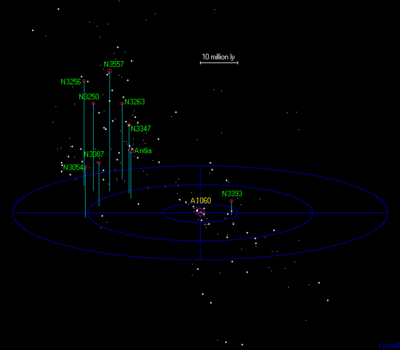Astronomy:Hydra-Centaurus Supercluster
| Hydra-Centaurus Supercluster | |
|---|---|
 Three-dimensional map of the Hydra Supercluster | |
| Observation data (Epoch J2000) | |
| Right ascension | 12h 48m 49.3s |
| Declination | −41° 18′ 40″ |
| Distance (co-moving) | ~54 Mpc (176 Mly) |
| Other designations | |
| SCI 128 | |
The Hydra-Centaurus Supercluster (SCl 128), or the Hydra and Centaurus Superclusters, is a supercluster in two parts, the closest neighbour of Virgo Supercluster.
Hydra-Centaurus
The cluster includes four large galaxy clusters in the Centaurus part
- Abell 3526 (Centaurus Cluster)
- Abell 3565
- Abell 3574
- Abell 3581
and the proximate
- Hydra Cluster (A1060)
- Antlia Cluster (AS0636)
Apart from the central clusters, which are 150 to 200 million light years away, several smaller clusters belong to the group.
Within the proximity of this supercluster lies the Great Attractor, dominated by the Norma Cluster (Abell 3627). This massive cluster of galaxies exerts a large gravitational force, causing all matter within 50 Mpc to experience a bulk flow of 600 km/s toward the Norma Cluster[1]
Laniakea
A 2014 announcement says that the Centaurus Supercluster (Hydra-Centaurus) is just a lobe in a greater supercluster, Laniakea, that is centered on the Great Attractor. That supercluster would include the Virgo Supercluster, therefore including the Milky Way where Earth resides.[2]
See also
- Abell catalogue
- Great Attractor
- Large-scale structure of the universe
- List of Abell clusters
- Supercluster
References
- ↑ Plionis, Manolis; Valdarnini, Riccardo (March 1, 1991). "Evidence for large-scale structure on scales about 300/h MPC". Monthly Notices of the Royal Astronomical Society 249 (March 1, 1991): 46–61. doi:10.1093/mnras/249.1.46. Bibcode: 1991MNRAS.249...46P.
- ↑ R. Brent Tully; Helene Courtois; Yehuda Hoffman; Daniel Pomarède (2 September 2014). "The Laniakea supercluster of galaxies". Nature 513 (7516): 71. doi:10.1038/nature13674. PMID 25186900. Bibcode: 2014Natur.513...71T.
External links
- Complete detail of Hydra Supercluster on atlasoftheuniverse.com
- Complete detail of Centaurus Supercluster on atlasoftheuniverse.com
Coordinates: ![]() 12h 48m 49.3s, −41° 18′ 40″
12h 48m 49.3s, −41° 18′ 40″
